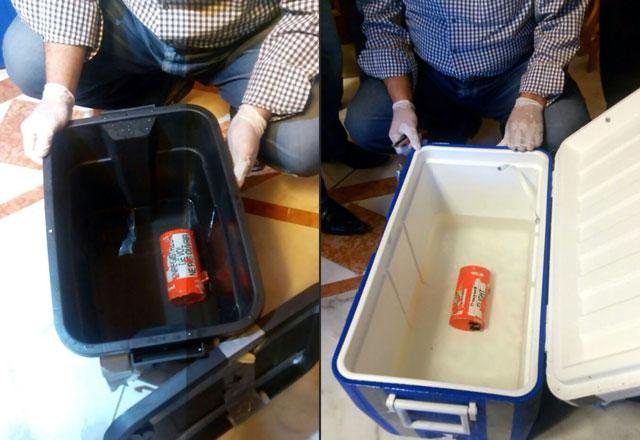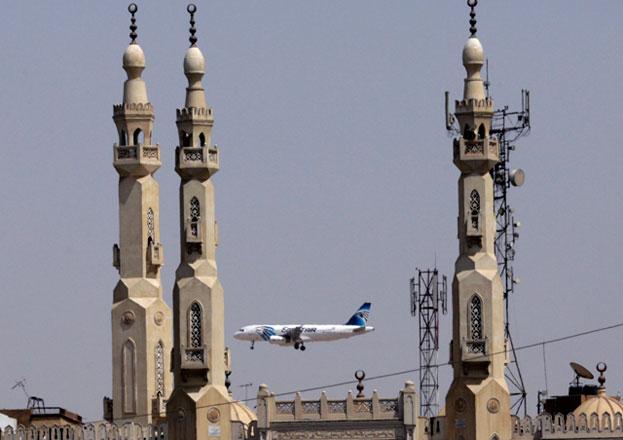You are here
EgyptAir black boxes badly damaged, likely to prolong probe
By AP - Jun 18,2016 - Last updated at Jun 18,2016

This combination of photos created on Friday shows a handout picture taken at an undisclosed location in Egypt and released by the Egyptian Media Centre of the ministry of civil aviation on Friday (AFP photo)
CAIRO — The voice and data recorders from the EgyptAir plane that crashed into the Mediterranean nearly a month ago are “extensively damaged” and will need repairs before they can be analysed, an Egyptian official said Friday, dampening hopes for quick answers as to what caused the disaster.
The official didn’t elaborate on how long the repairs would take but said if this cannot be done in Egypt, the so-called “black boxes” would be sent abroad. The official who spoke on condition of anonymity because he wasn’t authorised to speak to the media.
With the wreckage of the Airbus A320 some 3,000 metres under water, the cockpit voice and flight data recorders are vital for piecing together the last moments of the flight, which plunged into the sea between the Greek island of Crete and the Egyptian port city of Alexandria on May 19, killing all 66 on board.
Earlier in the day, Egypt’s investigation commission said the flight data recorder had been pulled out of the sea, a day after the cockpit voice recorder was also recovered. Both were brought to Cairo for analysis.
The memory units inside the recorders can provide key data, including the last conversations inside the cockpit, information about auto-pilot mode or even smoke alarms. They might also give answers to why the pilot made no distress call before the crash.
Experts say the data, combined with previously obtained satellite and radar images, debris analysis, the plane history and the pilots’ records, can shed light on the most possible scenarios. No militant group has claimed bringing down the aircraft.
“We will be having a wealth of information that helps the investigators eliminate some possibilities while giving priority to others,” said Hani Galal, an Egyptian aviation expert. He is not involved in this crash investigation but has taken part in other similar probes.
Both France and the United States are sending investigators to Cairo to help with the probe.
EgyptAir Flight 804 en route to Cairo from Paris disappeared May 19 from radar at about 2:45am local time, just as it had entered Egyptian airspace. Radar data showed the aircraft had made violent moves after cruising normally in clear skies, plummeting from 11,582 metres to 4,572 metres. It disappeared when it was at an altitude of about 3,048 metres.
Leaked flight data indicated a sensor had detected smoke in a lavatory and a fault in two of the plane’s cockpit windows in the final moments of the flight. Egypt’s civil aviation minister, Sherif Fathi, has said that terrorism is a more probable cause than equipment failure or some other catastrophic event.
Families of the victims are losing hope the remains of their loved ones can be recovered intact from the seabed so long after the crash but knowing what had caused it could bring closure.
“Finding answers to our many questions will give us some relief,” said Malek Zayada, speaking over the phone from the Sudanese capital, Khartoum. His brother, Mohammed Saleh Zayada, a 62-year-old UNESCO scholar who specialised in translation and history, was one of the passengers on the doomed flight.
Vessel John Lethbridge, contracted by the Egyptian government to search for the wreckage, pulled the data recorder out of the sea in stages, according to Friday’s statement from the Egyptian committee. On Thursday, the committee said that the voice recorder was also pulled out of the water but had been damaged.
“The analysis might take several weeks,” depending on the condition of the recorders’ memory units, the committee said.
The discovery of the boxes came after search teams earlier this week spotted the wreckage and started mapping its debris on the seabed. Previously, the Egyptian military announced only small floating pieces of debris and some human remains were found.
“The plane clearly suffered an instant severe damage that left it uncontrollable,” said Shaker Kelada, an EgyptAir official who was not involved in the search but has led other crash investigations for the national carrier. He said finding the black boxes was “a great success” but that “now time and patience is needed to analyse them”.
France’s Accident Investigating Bureau, or BEA, said Friday it’s sending an investigator to Cairo “to lend our technical expertise to the reading of the two recordings.” On Thursday, the US National Transportation Safety Board also said it’s sending an investigator and a recorder specialist to Cairo. Honeywell, the US technology company that manufactured the cockpit voice recorder, is providing technical support as well.
John Lethbridge, the vessel that found the wreckage, arrived on June 9 at the port of Alexandria, carrying highly specialised equipment of the Deep Ocean Search company. A statement from DOS said its team eventually narrowed down the search to a depth of about 3,000 metres — “ten times the height of London Shard tower”, a 95-storey skyscraper. Investigators said earlier that they had narrowed down search area to a 5-kilometre radius of the Mediterranean.
Galal warned against “jumping into conclusions” and added that the public should not expect investigators to “come up with answers tomorrow”.
“Sometimes it takes up to two years to understand what happened,” he said.
Related Articles
PARIS – A research vessel with an underwater robot is set to begin searching the Mediterranean “as from Friday” for the wreck of the EgyptAi
CAIRO — A search team on Thursday recovered the cockpit voice recorder from the EgyptAir plane that crashed into the Mediterranean last mont
CAIRO — Egypt said Wednesday that a French ship has picked up signals from deep under the Mediterranean Sea, presumed to be from one of the














